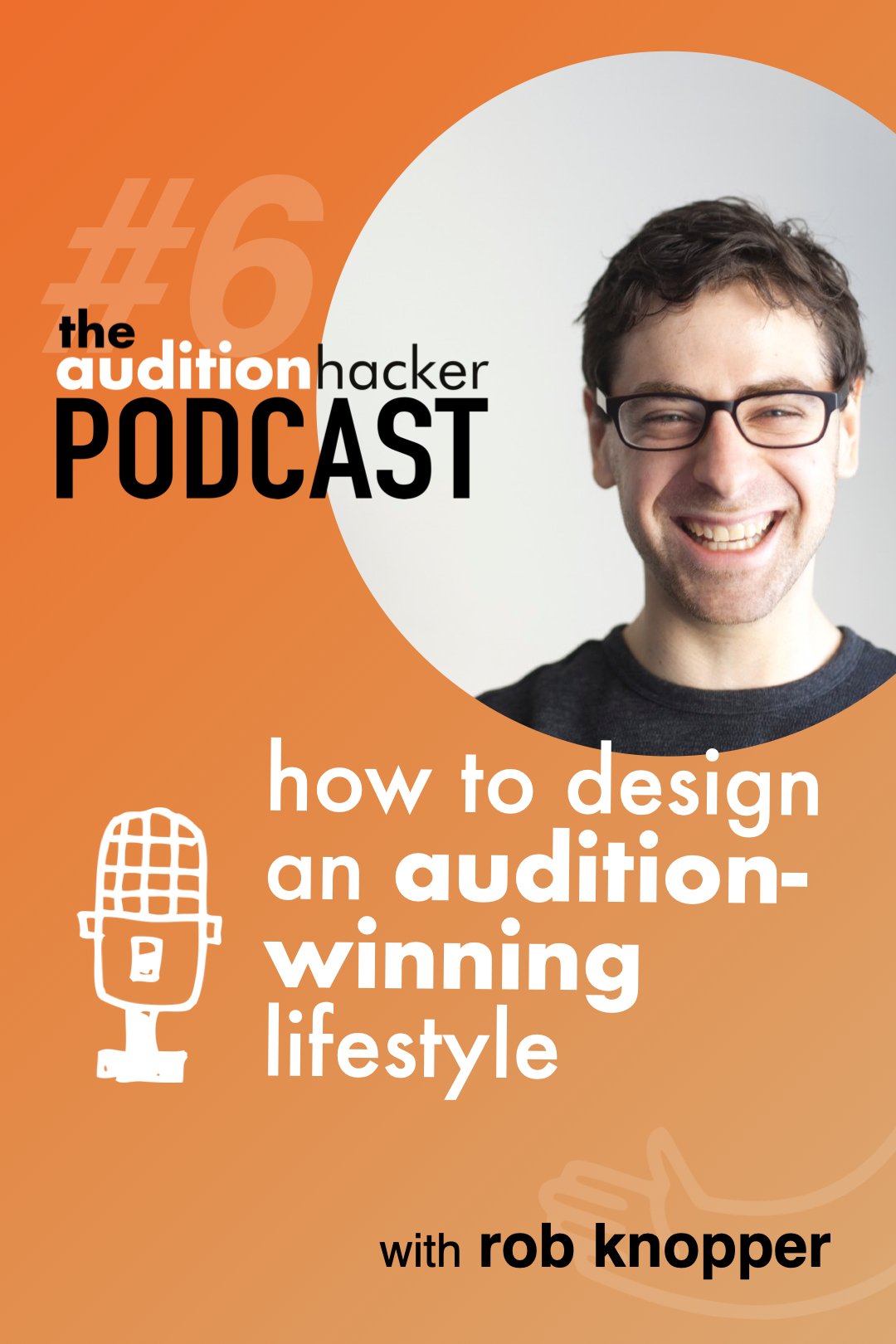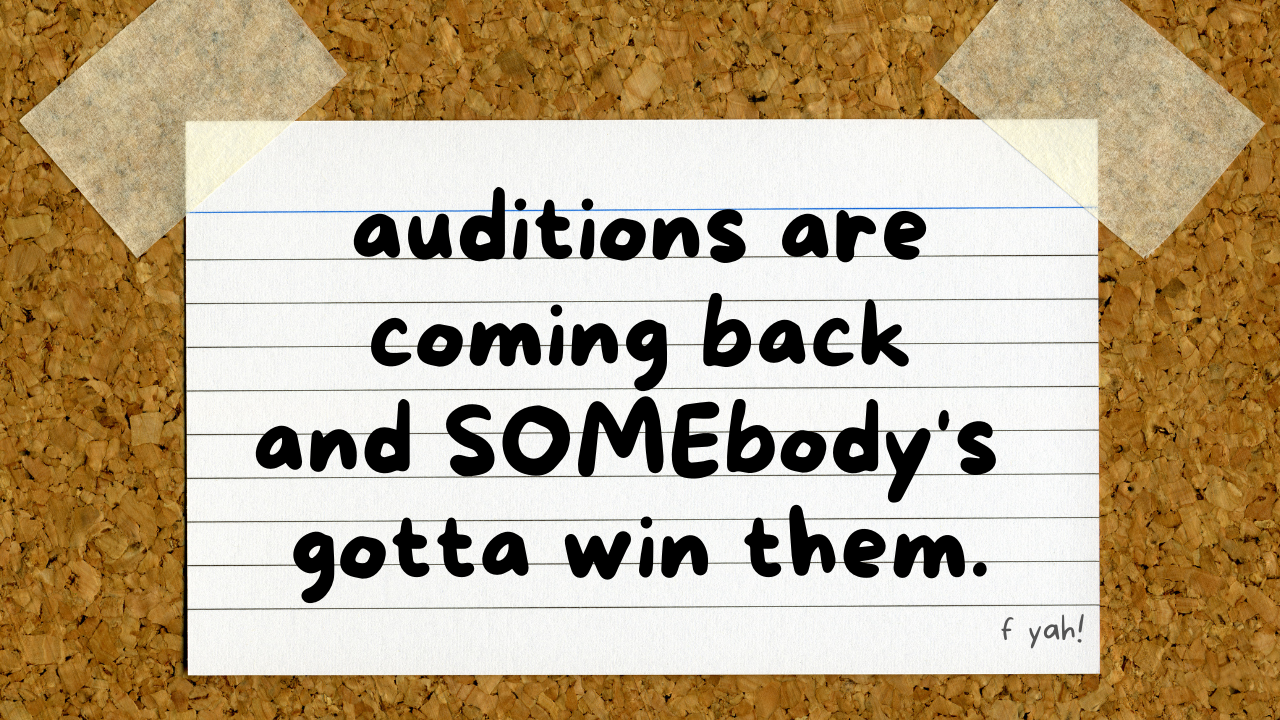ok…everybody think for a second about how next february (only 4 months away!) you’ll be walking into your college audition.
go ahead, scream it out.
aaahhhhhhhhhhhhhhhhhhhhhhhhhhhhhhhhhhhhhhhhhhhhhhhhhhhhh!
right now is the most important time to be diving into your college audition rep. you should pick your pieces NOW and work on them basically constantly from now until the day you leave for the audition. that’ll put you in the best position to do well on that all-important day that has such a profound impact on your future career as a musician.
it’s sort of like a butterfly effect. each little bit of practicing affects future you. the more practicing and focus you put into this now, the better your audition will be… the better school you’ll get into… the better your career will be. a lot’s on the line.
SO. in the next month i’m going to do my best to help you figure out how to practice for february auditions. and soon i’ll be opening up our winter boot camp (!) where we can work together on your audition prep. but today let’s talk about step 1: how to choose your college audition repertoire.
and i’ll dive into the THREE BIG CONSIDERATIONS:
consideration #1: difficulty
consideration #2: variety
consideration #3: personality
(oh, this is applicable to all instruments but i listed some percussion specific guidelines at the bottom of this blog.)
here we go.
noa kageyama (the bulletproof musician) and i teamed up to create a new cheat sheet to help you for any audition you have coming up.
the best part? it works for any instrument.
consideration #1: how difficult should your
pieces be?
should you choose something well beyond your ability, or something that seems almost easy?
this is tough. and the answer is… somewhere in the middle. let me explain by laying out the pros and cons for either decision.
here’s the deal with playing something HARD:
cons
1. you'll be so distracted by the difficulty of the notes that you'll forget about musicality.
it’ll be all you can do to survive your way through the crazy runs that you’ll still be learning notes until the day of the audition. it’ll be an athletic event rather than an emotional musical experience.
if it’s that hard, you’ll be lucky if you spend any time at all thinking about the phrasing, the tone, and all the other important elements that the audition panel will most certainly be listening for.
2. you might not actually be able to learn a hard piece as well as you want to.
your eyes might be bigger than your mouth. or whatever the parallel analogy is for learning music.
it’s a hard piece. there might be techniques that you don’t know how to play, and there’s no certainty that you’ll be able to overcome those weaknesses by audition day.
pros
1. it can be impressive as shit.
if you choose a show piece with lots of crazy runs and fast tempos, it has the potential to wow the panel. the audition panel may think you’re a badass.
excuse me. let me qualify that.
IF you nail it, the audition panel may think you’re a badass. and they’ll have to accept you immediately before some other school offers you a better scholarship.
2. it’ll feel more challenging and fun during the next 4+ months than an easy piece
you won’t get bored. you’ll be so much more excited to jump into the practice room every day when you’re putting together a monster of a piece.
and how about the pros and cons of playing something moderately easy? or at least within in the range of your abilities?
cons
1. you might get bored!
you might feel like you’ve done all you can do by december and it sucks that you have to practice the same piece for 2 more months. i would argue that there’s always more that you can do but still you might not want to be too bored for the next 4 months.
2. if it’s really too easy then the judges might hold that against you.
i guess there’s a threshold here… if it’s too elementary then the audition panel might question your ability to push yourself. “do we wanna accept this guy? it doesn’t sound like he pushes himself very hard…” of course they could also say “wow he made a very smart repertoire choice… didn’t try to go overboard and choose something crazy.”
pros
1. you can play an easy piece fearlessly
and with swagger.
an easy piece won't present any crazy new challenges and it will feel like less of a risk. and in the moment of the audition when you’re playing something well within your ability, that’s priceless. it’s going to look and sound easy.
your brain won’t be overwhelmed by the details of what’s going on so you can transcend above the moment-to-moment worries and focus on what’s important… musicality, phrasing, and the performance.
and when you’re thinking about musicality rather than playing all the notes, so will the audition panel. you’ll convey that sense of confidence through your presentation and body language.
2. you’ll know beyond the shadow of a doubt that you can fully prepare it by the time of the audition.
if you’re prone to anxiety (everyone is while preparing for an audition) it’ll help you sleep better, plan better, and live easier.
so how do you make this choice? choose something that’s not too far on either extreme.
the piece you choose shouldn’t be vastly beyond your ability to the point of a last minute emergency. it also should represent the fact that you have 4 months to spend with the piece.
so STRETCH yourself a little bit and choose something slightly beyond your ability, but not TOO far beyond it.
and look… this isn’t the advice i’d give you if you’re thinking about what pieces to play in a non-college audition year. if you’re just in undergrad or high school and trying to get better, you should choose something really hard and really exciting to push yourself to learn how to do lots of new things. but the purpose of learning your college audition repertoire isn’t just to get better, it’s to get into a college.
this is a life-or-death year. college auditions decide your life, so this decision has to be very carefully calibrated.
and remember, you’re not just learning the piece.
you’re FINISHING the piece.
with most pieces that you play for your teacher, and then even if you perform them at a recital or something, you’re spending the most time learning the notes and figuring out how to run through the damn thing. with your college audition piece, you’re going to polish it. you have to find every little out-of-place note and knock it into place… every measure has to have a phrase and every dynamic change has to clearly come out. if you’ve never done this kind of polished work you’re going to be surprised at how intense it can be. which is why an easier piece will feel like a bigger project for a college audition.
so. you’re gonna choose something a little bit beyond your abilities but still reasonable and doable. here’s the next issue to consider:
consideration #2: pick a piece with a lot of VARIETY.
your college audition is your entrance into a new school. they’re not trying to see whether you can simply play a piece…they’re trying to figure out who you are as a musician. the piece you choose should be interesting and show a lot of different styles. bonus points for different tempos. different textures are a MUST.
what are your strengths on your instrument? make sure your piece shows off a bunch of the things that you’re most awesome at. what are your weaknesses? yeah, hide those (if you can).
for instance, the piece hop by paul lansky for marimba is awesome but by itself (without the other two movements) it’s really the same texture all the way through.
but the piece ‘two moves for marimba’ by toshimitsu tanaka and has 3 different textures or styles even in these two lines.
consideration #3: what exemplifies your musical personality?
remember… you’re trying to show the audition panel who you are. you’re not just showing that you’re a good player, you’re showing that you have attention to detail, that you have a professional yet artistically interesting demeanor, and that you have a voice.
what is your voice? who are you?
what kind of music do you like? how do you want the audition committee to think of you?
are you into contemporary music, like ‘bleep bloop’ music by milton babbit? (cool if you are… i’m not.) are you into emotionally impactful tonal music, like eric ewazen or keiko abe? are you more of a traditionalist and find the most value in elegant music like bach and schumann?
what do you want to SAY? how do you want other people to think of you?
audition coming up? look no further.
noa kageyama (the bulletproof musician) and i created an all-new audition cheat sheet. click to check it out.
when i think of certain pieces, i associate them with the people who played the best rendition i’ve heard.
like… when we were in high school and wore light blue shirts at interlochen, matt kantorski played the most amazing rendition of astral dance by gordon stout that i’ve ever heard. it blew my mind.
velocities by joseph schwantner is ‘owned,’ in my mind, by jake nissly who played the shit out of that piece in college.
bach’s A minor fugue is all about brian flescher.
so think about it - what is your piece? what is the piece that you want them to remember you by?
ok. time to get started.
start early, practice hard, and FOCUS on your college audition rep all year!
whatever you do, start early and really dig in. you have to be working with a teacher and you have to be practicing this stuff ALL THE TIME.
college auditions are a big deal. you want to be getting into the best college your playing allows you to get into. the better the college you get into, the better the players around you will be. and the better you’ll be pushed to get better and better at that school. it means a better education you’ll get, better tips from teachers and conductors, and you’ll play better music.
this is an important time in your life so you want to put everything else on the back burner. this is the most important thing you should be working on right now, especially for you high school seniors.
it’s october. you should be getting your program together now and starting to learn the notes in a very deep way. it’s time.
and for you percussionists, here are
a few more thoughts.
marimba
usually you’re asked to do a 2-mallet piece and a 4-mallet piece. so can you show a diversity of styles there? maybe a bach and a contemporary?
for my undergrad auditions i play tambourin chinois by fritz kreisler and bach’s figue in g minor.
but maybe you do something like the prelude to bach’s e major partita (2 mallets) and a couple movements of druckman’s reflection on the nature of water.
make sure that if you play them all in one sitting, which you will, then it’s a well-balanced program.
snare drum
you probably are going to choose a classical and a rudimental piece. if you’re choosing one or the other… DEFINITELY a classical piece since they have much more variety than rudimental music in general. if there is a rudimental piece, try to choose something with lots of dynamic indications. like, pick a joe tompkins etude! his music is the best.
that’s it! any more percussion repertoire questions? let me know in the comments!!!












in 2019, a cellist named maria reached out to me about her audition struggles. on paper, she was the “worst audition candidate ever” (her words). she had 2 small children, a full-time teaching job, and hadn’t taken an audition in 4 years.